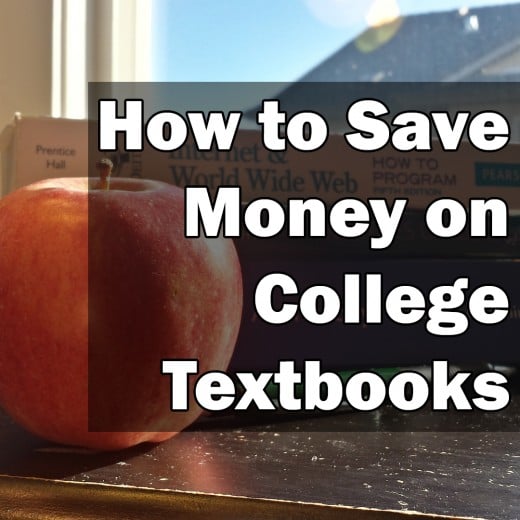How to Save Money on College Textbooks by Skipping the Campus Bookstore

There are Cheaper Options for College Textbooks
Every college student knows that textbooks don't come cheap. Even if you have scholarships, student loans, a part time job, or parent's who can afford to help you out, tuition and living expenses can be difficult to afford. On top of these necessities, many courses require you to purchase increasingly expensive textbooks. If you don't have financial aid to pay for your books, you may struggle to buy the books you need for classes. Even if you do have enough financial aid to cover tuition, housing, and books, it still might make more financial sense to look for cheaper textbook options and simply get a bigger refund back from your financial aid. You don’t need to give in to the outrageously high prices charged by the campus bookstore, as there are plenty of ways to find the books you need for a fraction of the price. Once you find out what books you need for next semesters’ classes, it is easy to locate them online for less than the campus bookstore is charging.

Online Sources for Textbooks
Most of the time you will end up spending significantly less on textbooks if you purchase them online instead of through your campus bookstore. This is especially true for textbooks that are at least one semester old, though occasionally you can find slightly better prices on newly published books online as well.
Amazon
You can usually get better prices on used, and occasionally new, textbooks on Amazon that through your school’s campus bookstore. Some books are available directly from Amazon. Others are sold by third party sellers. The books that are sold and shipped by Amazon, as well as the ones sold by third-party sellers using the Fulfilled by Amazon shipping program are eligible for free shipping through Amazon Prime. Others that are sold by third-party sellers may incur shipping charges, but the overall price is still likely to be cheaper than if you were to purchase books directly from the campus bookstore. If you create a seller account on Amazon, you can resell your textbooks to another student at the end of the semester. Amazon also buys certain textbooks back directly from customers, but don’t expect them to take every book or to offer even close to what you originally paid.
eBay
You can find a lot of good deals on textbooks on eBay. Sellers list textbooks in both auction and “buy it now” listings. If you are patient, you can find exceptionally good deals on textbook auction listings. If you don’t have enough time to wait for an auction to end, or just don’t like bidding, there are also good deals to be had on “buy it now” text book listings. There is also an abundance of international edition textbooks available on eBay, which can save you a ton of money if you are fine with purchasing textbooks meant for use outside the US (see below for more information on international editions). At the end of the semester it is easy to relist your textbooks for sale. In some cases, if you were able to locate an especially good deal when you bought the book, you might be able to make more selling the book than you originally paid. It doesn’t happen often, but it always feels awesome when it does.
TextBooks.com
TextBooks.com is a popular site to buy and sell used textbooks online. They have a wide variety of textbooks available, which are shipped to you directly from their warehouses. When you are ready to sell your books at the end of the semester, textbooks.com will give you a quote, and if you find their quote acceptable, you simply mail them your book and they pay you via PayPal or check. You probably won’t get as much back as you would by selling your books directly to another student on Amazon, eBay, or in person, but it is a quick way to get cash for your books without having to list your books and wait for an interested buyer.
There are also many other smaller booksellers on the Internet who specialize in selling textbooks to college students. If you can’t find a good deal on the sites listed above, it is easy to do a google search for the title and edition number or ISBN number of the textbook you need. The particular book that is required for your class might be available for the best price on some obscure smaller bookseller’s website. Sometimes you have to do extra research to find an acceptable price for a certain book.

Less Pricey Editions
Textbooks are always way overpriced, even if you do manage to find a great deal. If you really want to save money, it might be a good idea to look for International editions, binder-ready editions, digital editions, and possibly even previous editions of the textbook that you need. In some cases, it might even make more sense to rent textbooks instead of purchasing them outright.
International Editions
International editions are simply cheaper paperback editions of the regular US edition of textbooks. These are meant to be used by students outside of the United States. They have different covers and usually different ISBNs, but the contents of international editions are almost always exactly the same as the regular US edition textbook. Despite possible warnings that may be written on their covers, they are perfectly legal to use in the US. Publishers have tried and failed to have the sale of international editions banned in the United States to force students to only buy their overpriced US editions.
Binder-Ready Editions
Binder-ready editions are loose-leaf versions of normal textbooks. They have holes along the pages to allow students to put them in a 3-ring binder. The advantage to binder-ready textbooks, aside from costs, is that you can take just the chapters you need to class. The disadvantage is that you probably won’t be able to sell them back to the campus bookstore or to websites that offer to buy back textbooks. You may be able to sell them directly to other students on Amazon, eBay, or in person if you can assure them that none of the pages have gotten lost.
Previous Editions
Many times, previous editions of textbooks can be used for classes, as most textbooks don't change very much between editions. It is still a good idea to contact your professor before purchasing the previous edition, however, just in case some of the content has changed. If you can find a table of contents for the new and older editions, you might be able to compare them to see if there are any significant additions or changes to the new editions. Be aware that end-of-chapter questions might be changed between editions, even if the rest of the content hasn’t changed.
Digital Editions
Some textbooks are also available as digital downloads. The digital versions are usually cheaper than the print editions. If you are considering this option, verify with your professor whether you are allowed to use a laptop or tablet in class, or will even need to use the textbook during class. The downside of digital editions is that you can’t resell them when the semester is over.
Rental Textbooks
It may also be possible to rent certain textbooks for a lower price than buying them outright. Amazon and several other online textbook retailers offer rental options for certain books. Again, you won’t be able to resell these books at the end of the semester, but the upfront cost is lowered. This may be a good option for books that are likely to have new editions published before the next semester.

Buy, Sell, or Trade Directly with Other Students
Another possible option for saving money on books would be to try to buy, sell, or swap textbooks amongst other students at your college. Check social media to see if there are any textbook marketplace groups for you school. If nothing like that exists, consider starting your own group to buy and sell textbooks with other students. If any of your friends are about to take a class that you just finished, ask them if they need the same textbook and offer to sell it to them. Buying and selling directly with other students will probably net you more savings than going through the campus bookstore and dealing with their buyback program.
Don't Give In Textbook Retail Prices
It can be a huge waste of money to buy textbooks from the campus bookstore. If you shop smart, you can save a lot of money and save yourself the headache of waiting in line at the campus bookstore. You are already spending enough on tuition. There is no need to spend more than you have to on textbooks.
Poll
Where do you usually get your textbooks?
© 2017 Jennifer Wilber








